-
Signs That You Could Benefit from Intraocular Lenses
Intraocular lenses are implants that an ophthalmologist can surgically place in the eye. This type of eye surgery is most often performed for patients who require treatment for cataracts. However, intraocular implants may also be appropriate for vision correction. Because of the delicate nature of eye surgery and because your vision is so important, it’s critical to find an ophthalmologist who regularly performs this type of eye surgery in Chicago . Before undergoing any eye surgery, patients should be fully informed of what the procedure involves and what they can expect.
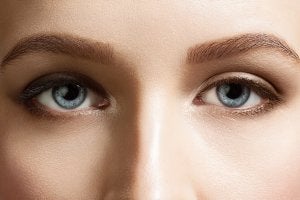
Cataracts
Cataracts are one of the most common causes of vision loss. They are cloudy areas on the lens of the eye that interfere with the ability of the lens to focus light on the retina. If you’ve been diagnosed with cataracts, eyeglasses may initially work to correct your vision. However, if you’re having trouble despite your eyeglasses, it may be time to consider cataract surgery to receive intraocular implants. If you haven’t yet been diagnosed, but are experiencing possible symptoms of cataracts, then it’s important to see your eye doctor right away. Cataracts can cause blurry, cloudy, or dim vision, impaired night vision, sensitivity to light and glare, the appearance of “halos” around light sources, double vision in one eye, and the fading of colors. During cataract surgery, the ophthalmologist will remove the natural lens of the affected eye and place an intraocular lens in its place.
Nearsightedness
Although the development of a cataract is the most common reason to have intraocular lens surgery, some patients with nearsightedness may undergo Visian ICL. These are implantable contact lenses that are surgically inserted into the eye to provide permanent vision correction. This FDA-approved procedure does not involve removing the natural lens; rather, the doctor implants the artificial lens in front of the natural lens. If you are nearsighted, this procedure may be right for you if you have trouble wearing contact lenses or you’re concerned about possible infections from contact lenses. Visian ICL may also be appropriate for people who prefer not to wear eyeglasses, including athletes.
-
Are You a Good Candidate for Intraocular Contact Lenses?
Are you tired of having to wear glasses or contacts to see well? If so, then you may be interested in treatment with intraocular implant lenses, or IOL. These lenses work similarly to contact lenses, but they are implanted into your eyes, offering you a more permanent form of vision correction. When determining your candidacy for IOL, there are several factors that your ophthalmologist near Chicago will consider.
Whether or not your eye doctor will recommend intraocular lenses can depend on your level of visual acuity. IOLs are considered ideal for individuals who have severe myopia, or nearsightedness, and are often advised for patients whose high level of myopia makes LASIK a poor choice. If you have nearsightedness greater than -10 or -11 diopters, then you could be a candidate for IOLs. If you’re interested in learning more about whether this procedure is right for you, then schedule an appointment with your eye doctor for an intraocular lens consultation.
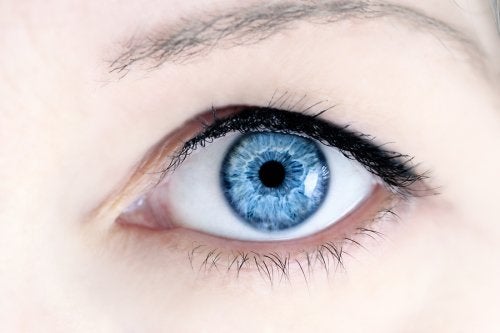
-
Tips for Preventing Eye Injuries Around the Home
With the growing popularity of DIY projects and home improvement repairs, it may come as no surprise that eye injuries that occur at home are on the rise. As part of your family’s ongoing eye care near Chicago, use the following tips to help prevent eye injuries around your home.
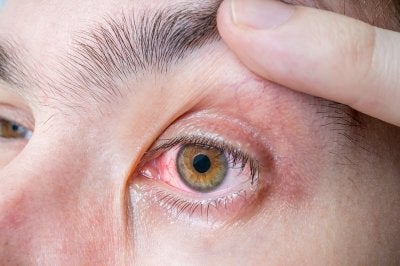
Inside the Garage
Unsurprisingly, many household eye injuries occur inside the garage or workshop. In many cases, these accidents result due to a lack of protective eyewear. If you are using chemicals, working with tools, securing items with bungee cords, or doing a task that creates dust or other eye irritants, it’s important to use caution. Due to the dangers that these activities can pose, eye doctors advise that you and anyone nearby wear protective goggles to help avert accidents.
In the Yard
While people often worry about the safety of using a lawnmower due to the sharp blades, this type of equipment can present a different kind of hazard. While they may seem innocuous, the pieces of grass and the dust particles that become airborne as you mow can be a threat to your eyes, so use protective eyewear for this task. The same eye care advice goes for using power trimmers on your shrubs and hedges.
Inside the House
Many of the eye injuries that occur inside the home involve chemicals and hazardous items such as bleach and household cleaners, so always wear protective goggles when necessary, and wash your hands after using these products to avoid getting them into your eyes. If anyone in your household uses curling irons or other heated styling devices near their face, remind them to take care when using these appliances, so they can avoid inadvertently making contact with their eyes. Also, eye injuries can occur when cooking due to splashing oil or other hot liquids, so always take care while in the kitchen. Finally, eye doctors advise that you always use caution while drilling or hammering, and even while opening champagne bottles, to help avoid injuries.
-
A Look at Common Symptoms and Causes of Glaucoma
Routine optical exams are an important part of overall eye care, so it’s important to see your eye doctor in Chicago regularly. Doing so can help keep your eyes healthy by detecting problems, such as glaucoma, in their early stages. Read on to learn more about this eye disease.
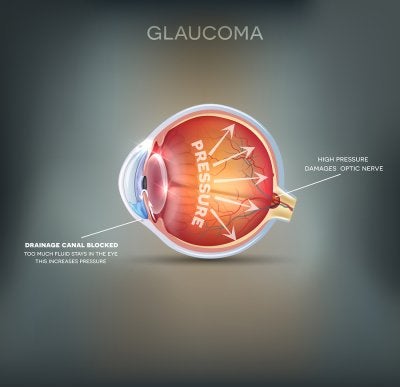
Glaucoma
Glaucoma typically results due to fluid buildup that increases the pressure in the eye and causes damage to the optic nerve. The early symptoms of glaucoma are often minor or non-existent, so many people do not realize that something is wrong with their eyes until the disease has become advanced. Because glaucoma progresses slowly and often develops unnoticed, it’s important to visit your ophthalmologist regularly for exams. When caught early, glaucoma treatment can help preserve your vision.
Symptoms
The most common form of this disease is called open-angle glaucoma, and it usually has no symptoms while it’s in its early stages. Eventually, the damage to the optic nerve begins to cause blanks spots in the individual’s vision, but even these are difficult to notice until they become substantial in size. Another form of this disease, called angle-closure glaucoma, can cause an acute attack. These attacks can result in nausea, vomiting, severe eye pain, blurry vision, headache, and rings or halos around lights. If you experience any of these symptoms, see an ophthalmologist immediately.
Causes
The inside of your eyes are lined with a layer of tissue that is sensitive to light, called the retina. The optic nerve, which is composed of many nerve fibers, runs like a cable between your retina and your brain, communicating signals from the eye, which your brain then interprets as images. The front portion of an eye contains a clear fluid called aqueous humor. A healthy eye continually produces new aqueous humor, while draining out the existing fluid at the same time. This process works to maintain the healthy balance of pressure within the eye. Eyes with glaucoma, however, fail to preserve this balance, and the added pressure damages the optic nerve fibers and leads to reduced vision or blindness.
-
Treating Age-Related Presbyopia with Eye Surgery
Presbyopia is a vision change that occurs with age. This condition causes problems with focusing on close work, which can be particularly problematic for individuals who work on computers and those who enjoy reading. If you’ve discovered that your contact lenses or eyeglasses are no longer sufficient for your vision, it’s time to make an appointment with an ophthalmologist near Chicago. An ophthalmologist may recommend eye surgery to correct your presbyopia .
As you’ll learn when you watch this video, vision correction for patients with presbyopia may involve the insertion of intraocular lenses (IOLs). This involves removing the natural lens of the eye and replacing it with a synthetic lens. Another possibility is refractive surgery. Your ophthalmologist can reshape your cornea to improve your vision.
-
A Look at the Different Types of Intraocular Lenses
Intraocular implants may be appropriate for some patients with cataracts or presbyopia. When you visit an optical center in Chicago to discuss having this type of eye surgery , the ophthalmologist will explain the different types of intraocular lenses (IOLs) that are available. One popular option is the monofocal lens, which is designed to provide optimal vision at near, intermediate, or far distances. If your monofocal lens is set for near distance, then you would need eye glasses to see at far distances. Another option is to set one lens for near and another for far distances. This is known as monovision and it provides vision at intermediate distances.
Alternatively, your ophthalmologist might recommend that you have multifocal or accommodative lenses. This is a newer type of IOLs that may reduce your dependence on glasses and contact lenses. A multifocal lens features a series of different focal zones, which can allow for both near and far distance vision.
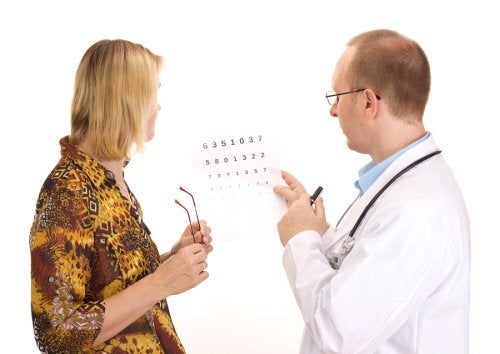
-
Taking Care of Your Eyes as You Age
Did you know that September has been designated as Healthy Aging Month? Its purpose is to remind people that it’s never too late in life to take control of their wellness. One commonly overlooked aspect of aging is its impact on your eyes. Visiting an ophthalmologist in Chicago regularly is important at every stage of life, but it’s particularly crucial as you grow older. Millions of Americans face blindness because of age-related vision changes. Scheduling a comprehensive exam every year with your eye doctor will help you manage your vision health. Not only can your ophthalmologist diagnose problems early on, but he or she can also provide some general eye care tips to help you protect your sight.
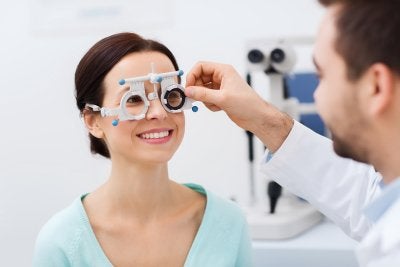
Kick the Habit
Your ophthalmologist might advise you to quit smoking. If you smoke, you should know that the habit directly increases your risk of developing cataracts and age-related macular degeneration. Tobacco use can also indirectly increase your risk of vision problems, such as by making you more susceptible to cardiovascular diseases that affect the health of your eyes. Quitting smoking is hard, but dealing with the health consequences of smoking is far worse. By quitting, you’ll improve the health of everyone around you as well as your own health. If you’re having trouble quitting or you need a little more convincing, your eye doctor may refer you to your primary care physician, who can connect you with appropriate resources in your community.
Pay Attention to Your Diet
When you were younger, you might have consumed sugary sodas and baked goods without a second thought, but the body of an older adult is less forgiving. You may have already realized that eating healthier is better for your energy levels, mood, and cardiac health, but it’s also good for your eyes. Certain foods are rich in the nutrients that your eyes need. These include cold water fish like salmon and tuna, dark green leafy vegetables like kale and spinach, and citrus fruits like kiwi and oranges. Eggs are also good for eye health because they contain lutein and zeaxanthin. These nutrients may offer some protection against age-related macular degeneration.
Manage Your Medical Conditions
If you’re undergoing regular wellness exams at your doctor’s office, then you might already know if you have high blood pressure, abnormal cholesterol levels, or high glucose levels. If so, it’s important to work with your doctor to manage these problems because they can affect your eye health.
-
What to Do to Prevent Eye Injuries
Eye diseases like macular degeneration aren’t the only problems that can rob a person of his or her healthy vision. Injuries to the eye can occur in mere moments, but they can have life-changing consequences. Residents of the Chicago area can get some eye care tips from their ophthalmologist. Even when individuals take precautions to protect their vision, accidents can occur from time to time. If you’ve suffered an eye injury, seek immediate medical attention.
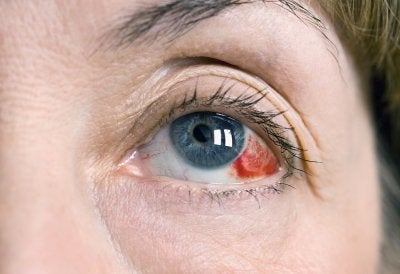
At Work
Work-related eye injuries are entirely too common. When a job exposes employees to hazardous chemicals, airborne debris, and other hazards, employers are supposed to provide proper protective gear, including safety goggles. However, it’s incumbent upon the employee to ensure that he or she follows safety guidelines and wears these goggles as needed. Adequate safety goggles are those that feature side shields. Other protective gear can include face shields , full-face respirators, welding helmets, work screens, and machine guarding. Individuals who wear eye glasses, rather than contact lenses, can consult an eye care professional about getting prescription safety goggles.
At Home
The workplace and the home are the two major places in which eye injuries occur. Eye doctors recommend taking precautions inside and outside the home to protect one’s eyes. Inside the home, some common hazards include cleaning chemicals, grease splatters, certain children’s toys such as projectiles, and tripping hazards. Champagne bottles are another potential hazard. When opening a champagne bottle, always point it at a 45-degree angle away from yourself and everyone else. After you’ve removed the wire hood, place a towel over the entire top of the bottle before twisting the cork out. Outside the home, yard work is often the greatest hazard for eye health. Before mowing the yard, walk over the entire area, removing branches and other potential projectiles. Do not allow children outdoors while mowing or doing other yardwork with power tools. Remember to wear safety goggles.
At the Gym
Thousands of people suffer from sports-related eye injuries each year. Some of those injuries occurred because the patients relied on their regular eye glasses to provide adequate protection. Safety goggles ought to be worn before engaging in certain sports, such as racquetball and basketball.
-
Protect Your Eyes in the Sun
You probably already know that wearing sunscreen while outdoors can help protect you from skin cancer. But did you know that the ultraviolet (UV) rays from the sun can also damage your eyes? In fact, your eye doctor may be more likely to diagnose you with age-related macular degeneration if you have excessive, unprotected sun exposure. You might also be more likely to undergo cataract surgery at a clinic in Chicago if you neglect to protect your eyes.
Watch this video and consult your eye doctor for some helpful eye care hints. This video recommends wearing sunglasses every time you go outdoors. Look for shades labeled “UV 400” or “100 percent UV protection.” Pair your sunglasses with a hat and recognize that sun damage can occur even on cloudy and winter days.
